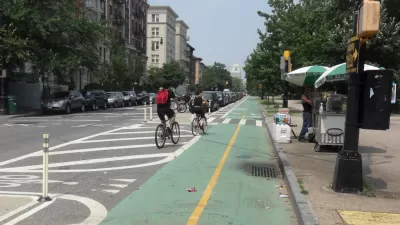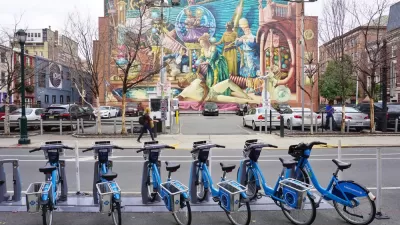For cities that want protected bike lanes but lack the expertise to implement them, the Green Lane Project is soliciting applications to offer technical help (sorry, no funding) now that the initial six recipient cities have implemented cycle tracks.
As we described here last August, "protected bike lanes, also referred to as 'cycle tracks' - are a special class of premium bike infrastructure where the bike lane is separated from car traffic by several possible means. It could be a row of parked cars or plastic bollards; sometimes it's just striped paint" (about a foot-wide as opposed to a single, striped line, in which case it may be called a 'buffered bike lane').
Angie Schmitt writes that the Green Lane Project initiative comes by way of "PeopleForBikes, the bike industry-supported advocacy organization."
In the first round, six cities — Washington, Portland, Austin, Memphis, Chicago, and San Francisco — were selected to help advance their next-generation bike infrastructure.
While 39 cities have been invited to apply for round two, any city with a population 80,000 is eligible.
The last round saw 42 applications from places as varied as Wichita and Pittsburgh. A new round of six cities will be selected for assistance in 2014 and 2015.
How popular are protected bike lanes among bike riders?
A recent poll of New York City cyclists circulated by Transportation Alternatives found overwhelming support for protected bike lanes over preferences for conventional bike lanes, sharrows, or street-riding with no lanes. Michael Anderson of the Green Lane Project writes on Oct. 17 that "a whopping 84 percent said protected lanes were the best".
While Green Lane "does not provide funding for infrastructure, [they] offer small grants (likely $20K to $25K) to the focus cities to aid in the implementation of protected bike lanes", according to the FAQ.
Interested? Applications are now being accepted from governmental agencies only. Submit a letter of intent to apply by November 15, 2013. Applications are due by January 14, 2014. Winners will be announced in March, 2014. Here's what Green Lane Project director Martha Roskowski is looking for:
The winning cities will have a mix of political will, committed staff, and community support to implement ambitious plans for protected bike lanes during the two-year campaign period.
More questions? Answers may be here.
FULL STORY: Green Lane Project Looking for Six New Cities With Big Bike Ambitions

Maui's Vacation Rental Debate Turns Ugly
Verbal attacks, misinformation campaigns and fistfights plague a high-stakes debate to convert thousands of vacation rentals into long-term housing.

Planetizen Federal Action Tracker
A weekly monitor of how Trump’s orders and actions are impacting planners and planning in America.

Chicago’s Ghost Rails
Just beneath the surface of the modern city lie the remnants of its expansive early 20th-century streetcar system.

Bend, Oregon Zoning Reforms Prioritize Small-Scale Housing
The city altered its zoning code to allow multi-family housing and eliminated parking mandates citywide.

Amtrak Cutting Jobs, Funding to High-Speed Rail
The agency plans to cut 10 percent of its workforce and has confirmed it will not fund new high-speed rail projects.

LA Denies Basic Services to Unhoused Residents
The city has repeatedly failed to respond to requests for trash pickup at encampment sites, and eliminated a program that provided mobile showers and toilets.
Urban Design for Planners 1: Software Tools
This six-course series explores essential urban design concepts using open source software and equips planners with the tools they need to participate fully in the urban design process.
Planning for Universal Design
Learn the tools for implementing Universal Design in planning regulations.
planning NEXT
Appalachian Highlands Housing Partners
Mpact (founded as Rail~Volution)
City of Camden Redevelopment Agency
City of Astoria
City of Portland
City of Laramie




























